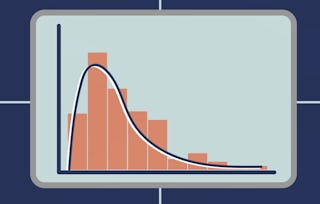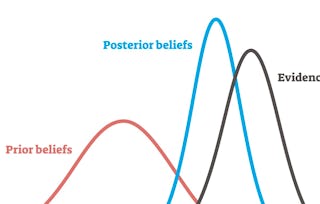This course describes Bayesian statistics, in which one's inferences about parameters or hypotheses are updated as evidence accumulates. You will learn to use Bayes’ rule to transform prior probabilities into posterior probabilities, and be introduced to the underlying theory and perspective of the Bayesian paradigm. The course will apply Bayesian methods to several practical problems, to show end-to-end Bayesian analyses that move from framing the question to building models to eliciting prior probabilities to implementing in R (free statistical software) the final posterior distribution. Additionally, the course will introduce credible regions, Bayesian comparisons of means and proportions, Bayesian regression and inference using multiple models, and discussion of Bayesian prediction.

Bayesian Statistics

Bayesian Statistics



Instructors: Mine Çetinkaya-Rundel
Access provided by Coursera Learning Team
76,745 already enrolled
798 reviews
Skills you'll gain
Details to know

Add to your LinkedIn profile
12 assignments
See how employees at top companies are mastering in-demand skills

Build your subject-matter expertise
- Learn new concepts from industry experts
- Gain a foundational understanding of a subject or tool
- Develop job-relevant skills with hands-on projects
- Earn a shareable career certificate

There are 7 modules in this course
This short module introduces basics about Coursera specializations and courses in general, this specialization: Statistics with R, and this course: Bayesian Statistics. Please take several minutes read this information. Thanks for joining us in this course!
What's included
1 video5 readings1 discussion prompt
<p>Welcome! Over the next several weeks, we will together explore Bayesian statistics. <p>In this module, we will work with conditional probabilities, which is the probability of event B given event A. Conditional probabilities are very important in medical decisions. By the end of the week, you will be able to solve problems using Bayes' rule, and update prior probabilities.</p><p>Please use the learning objectives and practice quiz to help you learn about Bayes' Rule, and apply what you have learned in the lab and on the quiz.
What's included
9 videos4 readings3 assignments
In this week, we will discuss the continuous version of Bayes' rule and show you how to use it in a conjugate family, and discuss credible intervals. By the end of this week, you will be able to understand and define the concepts of prior, likelihood, and posterior probability and identify how they relate to one another.
What's included
10 videos3 readings3 assignments
In this module, we will discuss Bayesian decision making, hypothesis testing, and Bayesian testing. By the end of this week, you will be able to make optimal decisions based on Bayesian statistics and compare multiple hypotheses using Bayes Factors.
What's included
14 videos3 readings3 assignments
This week, we will look at Bayesian linear regressions and model averaging, which allows you to make inferences and predictions using several models. By the end of this week, you will be able to implement Bayesian model averaging, interpret Bayesian multiple linear regression and understand its relationship to the frequentist linear regression approach.
What's included
11 videos3 readings3 assignments
This week consists of interviews with statisticians on how they use Bayesian statistics in their work, as well as the final project in the course.
What's included
3 videos1 reading
In this module you will use the data set provided to complete and report on a data analysis question. Please read the background information, review the report template (downloaded from the link in Lesson Project Information), and then complete the peer review assignment.
What's included
2 readings1 peer review
Earn a career certificate
Add this credential to your LinkedIn profile, resume, or CV. Share it on social media and in your performance review.
Instructors



Offered by
Why people choose Coursera for their career

Felipe M.

Jennifer J.

Larry W.

Chaitanya A.
Learner reviews
- 5 stars
45.23%
- 4 stars
20.42%
- 3 stars
14.53%
- 2 stars
9.27%
- 1 star
10.52%
Showing 3 of 798
Reviewed on Aug 24, 2017
An interesting and challenging course, would be better with more real examples and explanation as some of the material felt rushed
Reviewed on Dec 15, 2016
This is my first course on bayesian statistics, I really like it, it was step by step, and helps to clarify lots of concepts of frequentist statistic.
Reviewed on Jun 20, 2018
It was a good course, though I would include more coursework and exercises in R to assist with comprehending a difficult subject. Overall, good course for something that's difficult to teach.
Explore more from Data Science

University of California, Santa Cruz

University of California, Santa Cruz

Arizona State University

Illinois Tech


